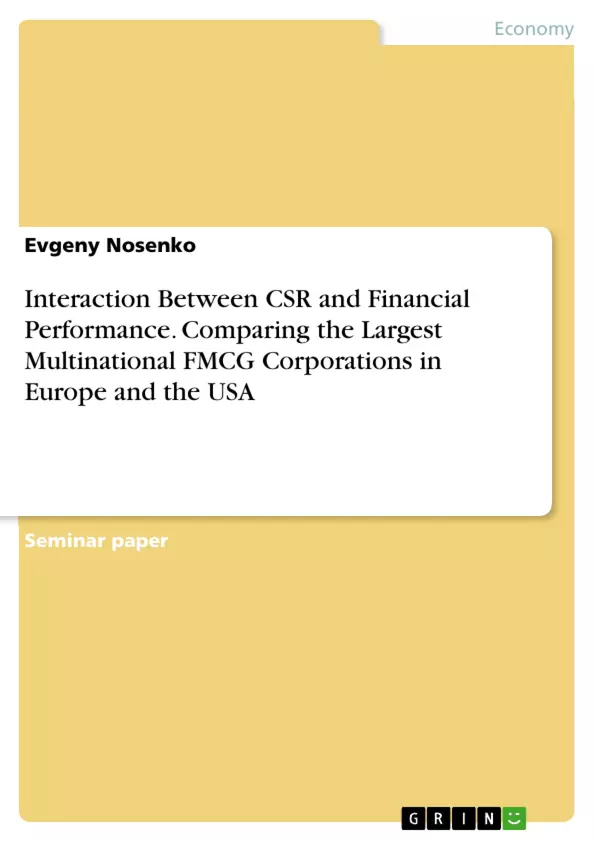Several research studies have examined corporate social responsibility (CSR) and its effects on business performance, but their results vary widely.
This paper studies the interaction between social, environmental and short-term financial performance. Using a sample of the 16 largest multinational FMCG companies from the US and Europe covering the period 2005-2012 and employing two different test methods, namely ordinary least squares (OLS) and Granger causation.
We demonstrate that while all CSR dimensions have significant financial effects, there has been only one causality link found between employment structure and short-term profitability.
Inhaltsverzeichnis (Table of Contents)
- Abstract
- Introduction
- Corporate Social Responsibility Theories: The Past and the Present.
- CSR Concepts Evolution
- Corporate Sustainability and Its Impact on Non-financial Reporting
- Empirical Analysis of CSR Practices and Corporate Financial Performance
- Sampling and data collection
- Descriptive Statistics
- Econometric Model
- Model Specification
- Granger Causality Test
- Empirical Results: Discussion
- Conclusion
- References
Zielsetzung und Themenschwerpunkte (Objectives and Key Themes)
This paper investigates the interaction between social, environmental, and short-term financial performance of multinational FMCG companies. The study aims to identify points of interaction between corporate social responsibility (CSR) and corporate financial performance (CFP), employing a sample of 16 of the largest multinational FMCG companies from the US and Europe covering the period 2005-2012.
- Examining the history and evolution of CSR concepts and practices.
- Analyzing the relationship between various CSR dimensions and financial performance.
- Applying econometric models, including OLS and Granger causality, to assess the interaction between CSR and CFP.
- Investigating the potential causal links between CSR practices and short-term profitability.
- Contributing to the understanding of the business case for CSR and its implications for corporate strategy.
Zusammenfassung der Kapitel (Chapter Summaries)
- Introduction: This chapter provides an overview of the research topic, highlighting the growing importance of CSR and the debate surrounding its impact on financial performance. It outlines the study's objectives and the key questions it seeks to address, emphasizing the need for further empirical research in this area.
- Corporate Social Responsibility Theories: The Past and the Present. This section discusses the evolution of CSR concepts and practices, examining different theoretical perspectives on the relationship between CSR and firm performance. It explores the corporate sustainability approach, which posits that firms achieving success in all three spheres of CSR (economic, social, and environmental) will attain long-term benefits.
- Empirical Analysis of CSR Practices and Corporate Financial Performance: This chapter delves into the methodology of the study, explaining the sampling and data collection process used to gather information on CSR and financial performance. It provides a detailed description of the data sources and the metrics employed to measure both social and financial performance.
- Econometric Model: This section presents the econometric models utilized in the analysis, including the ordinary least squares (OLS) regression and the Granger causality test. It explains the rationale for choosing these specific methods and their suitability for examining the interaction between CSR and CFP.
Schlüsselwörter (Keywords)
This paper focuses on the relationship between corporate social responsibility (CSR) and financial performance, particularly in the context of large multinational fast-moving consumer goods (FMCG) companies. Key concepts explored include the different dimensions of CSR, such as social, environmental, and economic performance, as well as various theoretical perspectives on the relationship between CSR and firm performance. The research employs econometric models, specifically ordinary least squares (OLS) regression and Granger causality, to analyze the interaction between CSR and short-term profitability. The study contributes to the ongoing debate on the business case for CSR and its implications for corporate strategy.
Frequently Asked Questions
Is there a significant link between CSR and financial performance?
The research shows that while CSR dimensions have financial effects, only specific links, such as between employment structure and short-term profitability, are consistently proven through causality tests.
Which companies were analyzed in this study?
The study focused on the 16 largest multinational Fast-Moving Consumer Goods (FMCG) corporations from Europe and the USA between 2005 and 2012.
What is the "Business Case for CSR"?
It refers to the theory that companies achieving success in economic, social, and environmental spheres will attain better long-term financial results and competitive advantages.
What econometric models were used in the analysis?
The paper employed Ordinary Least Squares (OLS) regression and the Granger causality test to investigate the interaction between CSR and financial performance.
How has the concept of Corporate Sustainability evolved?
The thesis traces the evolution of CSR from a purely philanthropic idea to a strategic non-financial reporting requirement that impacts corporate strategy and investor relations.
- Quote paper
- Evgeny Nosenko (Author), 2014, Interaction Between CSR and Financial Performance. Comparing the Largest Multinational FMCG Corporations in Europe and the USA, Munich, GRIN Verlag, https://www.grin.com/document/298397



